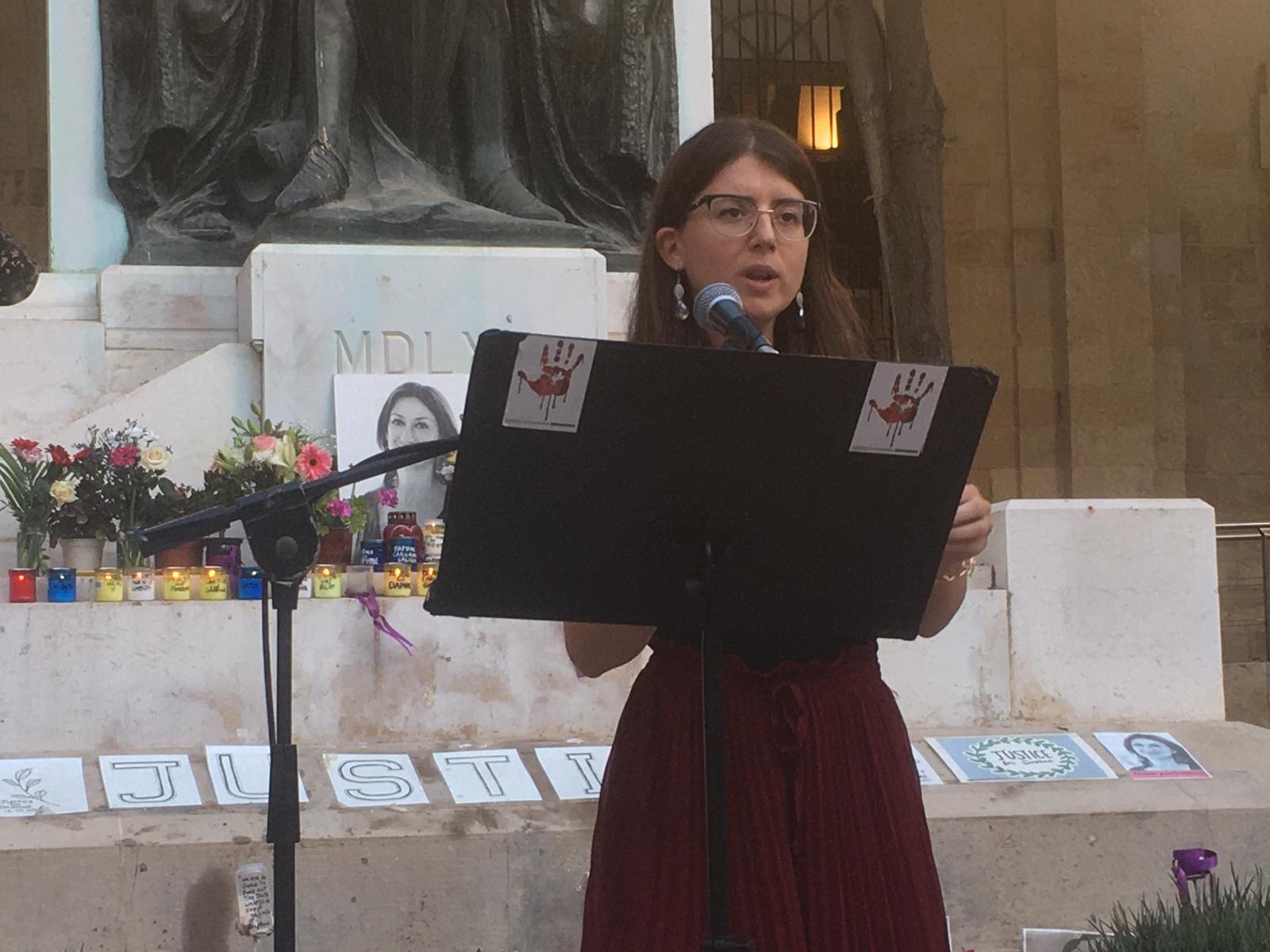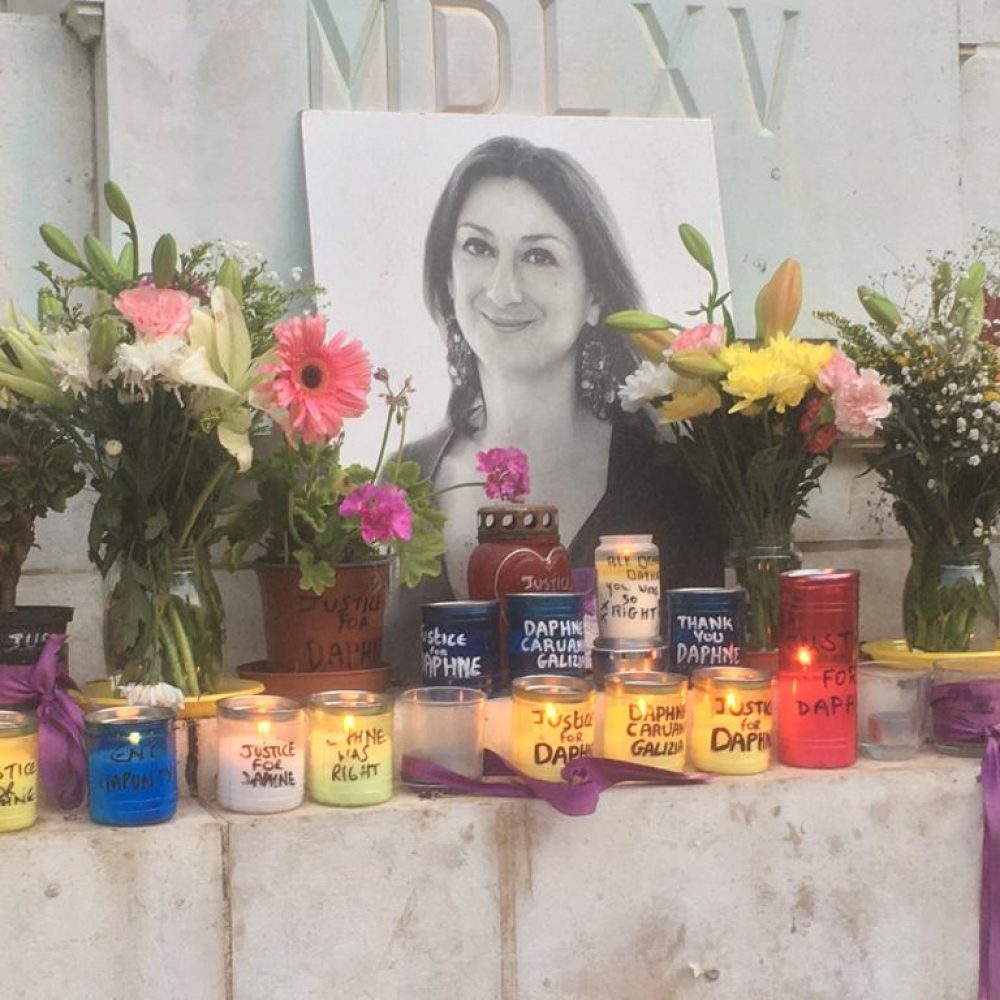Forty-five months have passed since Maltese investigative journalist Daphne Caruana Galizia was brutally murdered with a car bomb just down the road from her home on a sunny October afternoon.
Activists in Malta held a vigil on the date, as they have done on the 16th of every month, reiterating the call for justice for the slain journalist and her stories.
“We’ve spent the last three years hearing horrific information coming out in court and almost every week we are graced with a new scandal,” Martina Farrugia said, in a fiery speech that placed responsibility firmly in the hands of those in power to deal with the disgraced politicians they replaced.

“Despite all the damning information that has come out in court over the last four years,” she said, “instead of the government being embarrassed and taking action against those who are repeatedly mentioned, they turn the tables, rally their trolls and accuse anyone who speaks up of being a traitor.”
As if to confirm Farrugia’s remarks, former Justice Minister Owen Bonnici sparked outrage by publishing a column in the country’s leading newspaper pontificating about human rights, discrimination, and ‘the Malta he believes in’ – an attempt at distracting Labour supporters.
As justice minister, Bonnici was slammed by the Constitutional Court for breaching the human rights of protestors by ordering the repeated midnight clearing of the protest memorial to Caruana Galizia at the foot of the Great Siege monument in the country’s capital.
He was one of the public inquiry’s most strident opponents, travelling to Strasbourg in April 2019 with then-Attorney General Peter Grech to tell the Parliamentary Assembly of the Council of Europe that such an inquiry could not take place because it would interfere with the criminal case against those charged with the journalist’s murder.
Meanwhile, the many court cases associated with Caruana Galizia’s death, and with the corruption stories she exposed, are grinding through Malta’s judicial system at a glacial pace.
The latest hearing saw Adrian Hillman, the former Managing Director of Allied Newspapers, publishers of The Times of Malta, refuse to answer questions related to his offshore companies, and about whether or not he’d met with his co-accused, Brian Tonna and Karl Cini, the accountants at the heart of so many shady deals and offshore structures under Joseph Muscat’s government.
Hillman has been charged with money laundering and a list of financial crimes alongside Tonna, Cini, former chief of staff Keith Schembri and others in relation to kickbacks on the purchase of printing equipment to the publishers. Like so many other corruption scandals under this government, this story was first exposed by Daphne Caruana Galizia.
Hillman’s silence in court seemed to contradict claims by his lawyer that his return to Malta to clear his name was “voluntary” despite an extradition, and that he was “cooperating”. Hillman only returned to the island more than two months after charges against him were announced.
The case is likely to be a long one, given the complicated nature of the crimes, and the boxes filled with uncatalogued documents being dumped on the courts as evidence, a process that a frustrated Magistrate Donatella Frendo Dimech slammed as “unprofessional” as she warned the prosecution: “Get your act together”.
As the hearings drag on and the course of justice begins to resemble a filibuster aimed at running out the clock, the panel of judges leading the public inquiry into Caruana Galizia’s death have confirmed that they expect to present the inquiry’s findings to Prime Minister Robert Abela and the Attorney General in the coming days.
According to the terms of reference, the report must be published within eight working days of delivery. On the government side, Abela has five working days to table the report in parliament — a parliament which is currently closed for the summer break.
That is as far as the terms of reference go. There are no provisions to act on the inquiry’s findings — not even if the board decides the government was directly responsible for Caruana Galizia’s death, or if members of government acted to obstruct the murder investigation to shield guilty parties.
The public testimony from the many hearings presented a damning picture of complicity, inaction and deep-seated corruption, but with Malta headed into an election and both parties in election mode, the chances of serious self-assessment and change do not appear optimistic.
The government has already begun disseminating counter-narratives to prepare for a report everyone expects will be scathing.
While a significant portion of the electorate wants to see justice done, with a sweeping cleanup of the actors and actions responsible for the steady erosion of the country’s reputation since 2013 that culminated in Malta’s greylisting by the Financial Action Task Force, a larger number of Labour supporters seem to want these issues to simply go away.
Chalking up the inquiry’s outcome as ‘lessons learned’ would be a mistake. The wholesale criminal takeover of Malta and the murder of the one investigative journalist who repeatedly exposed it is a European concern, not just a national issue.
The reality of this was brought home by the murder of Dutch journalist Peter de Vries, shot in the head while leaving a television studio in Amsterdam on 6 July. Like Daphne Caruana Galizia, De Vries had received multiple threats for his work, which included investigating ‘cold case’ killings, drug dealing and organized crime.
De Vries was the fourth journalist murdered in the European Union in the last four years. Caruana Galizia was killed in October 2017. Slovakian investigative journalist Jan Kuciak and his fiancé were shot to death near Bratislava in February 2018. And Greek journalist Giorgos Karaivaz was gunned down in April outside his Athens home.
In a statement issued in response to his death, the Daphne Caruana Galizia Foundation urged authorities across Europe to bring the killers to justice, and to put preventive systems in place to protect those who are on the front lines protecting our democracies.
“In 2017, Daphne Caruana Galizia’s family warned her assassination had set a new standard of permissible behaviour within the EU, and that others would soon die if decisive action isn’t taken,” they said. “As with other journalists who have been killed since, Peter de Vries’ life could have been saved.”
The following project is weekly Maltese Roundups prepared by The Shift News (Malta) offering the latest news in Daphne Caruana Galizia case.

